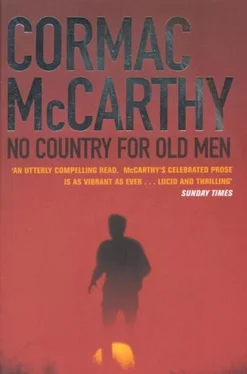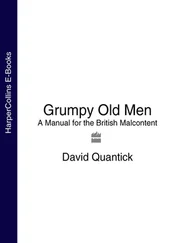He cut a length from the Venetian blind cord at the window and tied the end of the cord to the case. Then he unlatched the case and counted out a thousand dollars and folded the money and put it in his pocket and shut the case and fastened it and fastened the straps.
He got the clothes pole out of the closet, sliding the wire hangers off onto the floor, and stood on the dresser again and pushed the case down the duct as far as he could reach. It was a tight fit. He took the pole and pushed it again until he could just reach the end of the rope. He put the grille back with its rack of dust and fastened the screws and climbed down and went into the bathroom and took a shower. When he came out he lay on the bed in his shorts and pulled the chenille spread over himself and over the submachinegun at his side. He pushed the safety off. Then he went to sleep.
When he woke it was dark. He swung his legs over the edge of the bed and sat listening. He rose and walked to the window and pulled the curtain back slightly and looked out. Deep shadows. Silence. Nothing.
He got dressed and put the gun under the mattress with the safety still off and smoothed down the dustskirt and sat on the bed and picked up the phone and called a cab.
He had to pay the driver an extra ten dollars to take him across the bridge to Ciudad Acuña. He walked the streets, looking into the shopwindows. The evening was soft and warm and in the little alameda grackles were settling in the trees and calling to one another. He went into a boot shop and looked at the exotics – crocodile and ostrich and elephant – but the quality of the boots was nothing like the Larry Mahans that he wore. He went into a farmacia and bought a tin of bandages and sat in the park and patched his raw feet. His socks were already bloody. At the corner a cabdriver asked him if he wanted to go see the girls and Moss held up his hand for him to see the ring he wore and kept on walking.
He ate in a restaurant with white tablecloths and waiters in white jackets. He ordered a glass of red wine and a porterhouse steak. It was early and the restaurant was empty save for him. He sipped the wine and when the steak came he cut into it and chewed slowly and thought about his life.
He got back to the motel a little after ten and sat in the cab with the motor running while he counted out money for the fare. He handed the bills across the seat and he started to get out but he didnt. He sat there with his hand on the doorhandle. Drive me around to the side, he said.
The driver put the shifter in gear. What room? he said.
Just drive me around. I want to see if somebody's here.
They drove slowly past his room. There was a gap in the curtains he was pretty sure he hadnt left there. Hard to tell. Not that hard. The cab tolled slowly past. No cars in the lot that hadnt been there. Keep going, he said.
The driver looked at him in the mirror.
Keep going, said Moss. Dont stop.
I dont want to get in some kind of a jackpot here, buddy.
Just keep going.
Why dont I let you out here and we wont argue about it.
I want you to take me to another motel.
Let's just call it square.
Moss leaned forward and held a hundred dollar bill across the seat. You're already in a jackpot, he said. I'm tryin to get you out of it. Now take me to a motel.
The driver took the bill and tucked it into his shirtpocket and turned out of the lot and into the street.
He spent the night at the Ramada Inn out on the highway and in the morning he went down and ate breakfast in the diningroom and read the paper. Then he just sat there.
They wouldnt be in the room when the maids came to clean it.
Checkout time is eleven oclock.
They could have found the money and left.
Except of course that there were probably at least two parties looking for him and whichever one this was it wasnt the other and the other wasnt going away either.
By the time he got up he knew that he was probably going to have to kill somebody. He just didnt know who it was.
He took a cab and went into town and went into a sporting goods store and bought a twelve gauge Winchester pump gun and a box of double ought buckshot shells. The box of shells contained almost exactly the firepower of a claymore mine. He had them wrap the gun and he left with it under his arm and walked up Pecan Street to a hardware store. There he bought a hacksaw and a flat millfile and some miscellaneous items. A pair of pliers and a pair of sidecutters. A screwdriver. Flashlight. A roll of duct tape.
He stood on the sidewalk with his purchases. Then he turned and walked back down the street.
In the sporting goods store again he asked the same clerk if he had any aluminum tentpoles. He tried to explain that he didnt care what kind of tent it was, he just needed the poles.
The clerk studied him. Whatever kind of tent it is, he said, we'd still have to special order poles for it. You need to get the manufacturer and the model number.
You sell tents, right?
We got three different models.
Which one has got the most poles in it?
Well, I guess that would be our ten foot walltent. You can stand up in it. Well, some people could stand up in it. It's got a six foot clearance at the ridge.
Let me have one.
Yessir.
He brought the tent from the stockroom and laid it on the counter. It came in an orange nylon bag. Moss laid the shotgun and the bag of hardware on the counter and untied the strings and pulled the tent from the bag together with the poles and cords.
It's all there, the clerk said.
What do I owe you.
It's one seventy-nine plus tax.
He laid two of the hundred dollar bills on the counter. The tentpoles were in a separate bag and he pulled this out and put it with his other things. The clerk gave him his change and the receipt and Moss gathered up the shotgun and his hardware purchases together with the tentpoles and thanked him and turned and left. What about the tent? the clerk called.
In the room he unwrapped the shotgun and wedged it in an open drawer and held it and sawed the barrel off just in front of the magazine. He squared up the cut with the file and smoothed it and wiped out the muzzle of the barrel with a damp facecloth and set it aside. Then he sawed off the stock in a line that left it with a pistol grip and sat on the bed and dressed the grip smooth with the file. When he had it the way he wanted it he slid the forearm back and slid it forward again and let the hammer down with his thumb and turned it sideways and looked at it. It looked pretty good. He turned it over and opened the box of shells and fed the heavy waxed loads into the magazine one by one. He jacked the slide back and chambered a shell and lowered the hammer and then put one more round in the magazine and laid the gun across his lap. It was less than two feet long.
He called the Trail Motel and told the woman to hold his room for him. Then he shoved the gun and the shells and the tools under the mattress and went out again.
He went to Wal-Mart and bought some clothes and a small nylon zipper bag to put them in. A pair of jeans and a couple of shirts and some socks. In the afternoon he went for a long walk out along the lake, taking the cut-off gunbarrel and the stock with him in the bag. He slung the barrel out into the water as far as he could throw it and he buried the stock under a ledge of shale. There were deer moving away through the desert scrub. He heard them snort and he could see them where they came out on a ridge a hundred yards away to stand looking back at him. He sat on a gravel beach with the empty bag folded in his lap and watched the sun set. Watched the land turn blue and cold. An osprey went down the lake. Then there was just the darkness.
I was sheriff of this county when I was twenty-five. Hard to believe. My father was not a lawman. Jack was my grandfather. Me and him was sheriff at the same time, him in Piano and me here. I think he was pretty proud of that. I know I was. I was just back from the war. I had some medals and stuff and of course people had got wind of that. I campaigned pretty hard. You had to. I tried to be fair. Jack used to say that any time you're throwin dirt you're losin ground but I think mostly it just wasnt in him. To speak ill of anybody. And I never did mind bein like him. Me and my wife has been married thirty-one years. No children. We lost a girl but I wont talk about that. I served two terms and then we moved to Denton Texas. Jack used to say that bein sheriff was one of the best jobs you could have and bein a ex-sheriff one of the worst. Maybe lots of things is like that. We stayed gone and stayed gone. I done different things. Was a detective on the railroad for a while. By that time my wife wasnt all that sure about us comin back here. About me runnin. But she seen I wanted to so that's what we done. She's a better person than me, which I will admit to anybody that cares to listen. Not that that's sayin a whole lot. She's a better person than anybody I know. Period.
Читать дальше












